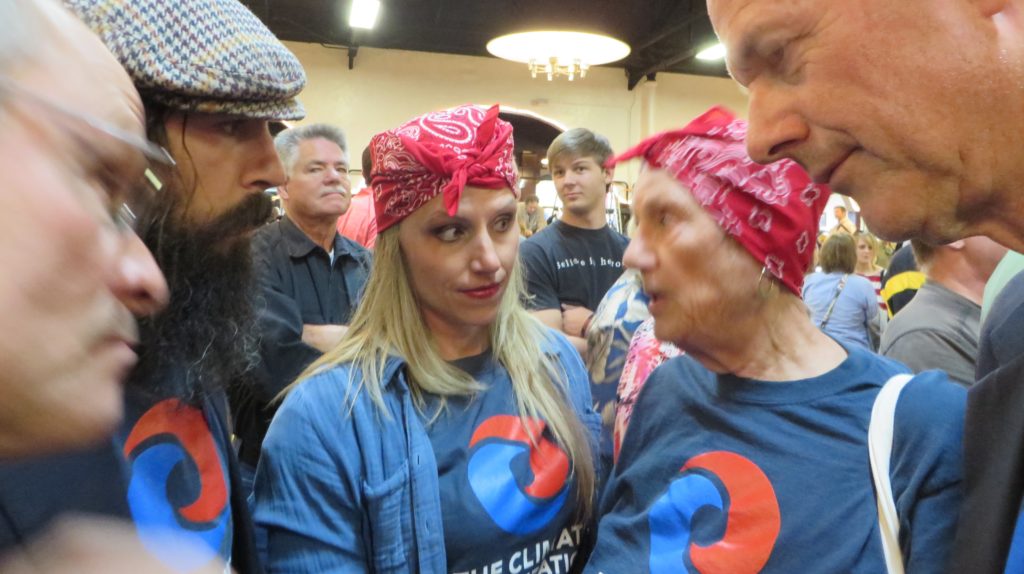Dear Friends,
Nonviolent civil disobedience is a time-honored tradition in America, dating back to the Boston Tea Party. Basically, when all else fails, civil resistance kicks in.

Margaret Klein Salamon
A growing universe of climate-conscious Americans concur that the time for such resistance has arrived. Sure, Congress just passed the most comprehensive climate bill ever, but it’s woefully inadequate to meet the goals laid out by scientists if we are to avoid catastrophic climate change.
(To those who enquired, yes, if I were in Congress, I would have voted for that bill, following the standard that guided me as an Iowa legislator — if 51% of a bill is good, support it.)
At about the 19-minute mark of today’s program, I talk with Rob Hach about the climate bill’s impact on solar and wind energy projects. Rob’s a lets-work-with-the-system kinda guy. He and his company, Trusted Energy, are doing solid work expanding renewable energy infrastructure.
My other guest this week is Margaret Klein Salamon. Margaret and I worked together in 2015 before the Iowa Caucuses, organizing volunteers to bird-dog Democratic and Republican presidential candidates to raise the profile of climate change. Our campaign never employed civil disobedience, but a handful of us did get thrown out of a Trump rally sporting signs and chanting “MOBILIZE NOW.”
Margaret appeared in a recent NY Times story, “These Groups Want Disruptive Climate Protests. Oil Heirs Are Funding Them.” She’s a clinical psychologist, founded The Climate Mobilization, and wrote Facing the Climate Emergency: How to Transform Yourself with Climate Truth. She now directs the Climate Emergency Fund, which supports many climate organizations, some that employ civil disobedience.
Margaret contends that civil disobedience — or “disruption,” as it’s sometimes called — is necessary to shock people out of the delusion that what we’re experiencing with climate change is normal and acceptable.

Trump supporters eye us as during our work with The Climate Mobilization in 2016. From left: Peter Clay, George McCloskey, Kristy Medo, Miriam Kashia, and Ed Fallon. (Photo: Shari Hrdina)
And activists have indeed engaged in some shocking, yet completely nonviolent, tactics:
Disrupting the French Open.
Blocking the Tour de France.
Storming the track at the British Grand Prix.
Tying themselves to goal posts during soccer matches. In fact, this type of protest is becoming so common in Europe that The Bulletin said: “Pitch stormers chaining themselves to goal posts seem to be setting a new trend in the world of football. A week ago, the Bundesliga match between Frankfurt and Freiburg was stopped for the same reason, and last month there were several similar incidents in the English Premier League.”
On this side of the Atlantic, on July 4, climate activists blocked a major highway outside of Washington, DC. Check out this video and the furious response from one driver.
With every such act of disruption, public reaction has, predictably, been less than positive. Way less, in fact. I ask Margaret about this negative public reaction. She responds: “It’s really not important whether the activists are popular. They can be unpopular and still change public opinion drastically because they’re still breaking through that wall of denial.”
I push back: “If you’re alienating people, isn’t that counter productive?”
Margaret: “We’ve just tried every other way, every polite, non-disruptive approach, and the results are unsatisfactory.”
I ask Margaret, as a clinical psychologist, what would be her advice to people who feel frightened or immobilized by the climate crisis. She says, “It’s ok to feel terrified or grief-stricken or enraged or depressed or whatever it is that you feel. We’re in a really intense situation. Big feelings should be expected. In fact, if you aren’t having them, you should check in. So process your feelings, talk about them with others, don’t be alone with this, and let it drive you to action. That’s really the key thing. Those feelings are telling you that we’re in danger and need to transform. Let’s get busy.”
I’m no stranger to nonviolent civil disobedience, having been arrested six times. Given the possibility of human extinction as the planet continues to heat up, I absolutely get where Margaret’s coming from. I also understand the critics, who insist that we have to build greater public support in the fight against climate change, and actions that alienate people set us back.
It’s an important conversation, which brings me to this week’s call to action:
LET’S TALK! DO YOU SUPPORT OR OPPOSE DISRUPTIVE CLIMATE ACTION LIKE THOSE DESCRIBED ABOVE? Share your thoughts with me by responding to this message. I’ll write back, share some of your comments with Margaret, and possibly continue the discussion on a future Forum.
Also on this week’s program, I respond to the feedback received after my conversation with Jen Senko about her film and book, The Brainwashing of My Dad.
Finally, Kathy Byrnes and I share our dissatisfaction with the industrial egg display at the Iowa State Fair. Interestingly, Big Egg’s presentation has gone from dissing backyard chicken people to ignoring us. Progress?
Thanks for reading, listening, and taking action. — Ed
*******
(02:42) Brainwashing vs good old-fashioned gullibility;
(19:48) A wind professional’s take on the climate bill, with Rob Hach, Trusted Energy;
(38:26) Escalating climate civil disobedience, with Margaret Klein Salamon, Climate Emergency Fund;
(54:10) Fair display unfair to backyard chickens, with Kathy Byrnes, Birds & Bees Urban Farm.
– KHOI 89.1 FM (Ames, Iowa)
– KICI.LP 105.3 FM (Iowa City, Iowa)
– WHIV 102.3 FM (New Orleans, Louisiana)
– KPIP-LP, 94.7 FM (Fayette, Missouri)
– KCEI 90.1 FM (Taos, New Mexico)
– KRFP 90.3 FM (Moscow, Idaho)
– WGRN 94.1 FM (Columbus, Ohio)
– KKFI 90.1 FM (Kansas City, Missouri)
Please support the local businesses and non-profits who make this program possible. Click on their logos on the Fallon Forum website and in our weekly email, and visit Dr. Drake Family Psychiatry, Story County Veterinary Clinic, Bold Iowa, and Birds & Bees Urban Farm. Thanks for supporting the civil alternative to the shock jocks!

Ed Fallon

I support extreme actions because they move the far left edge of the distribution curve, allowing the majority to shift towards the moderate side (which seems less extreme by contrast!)